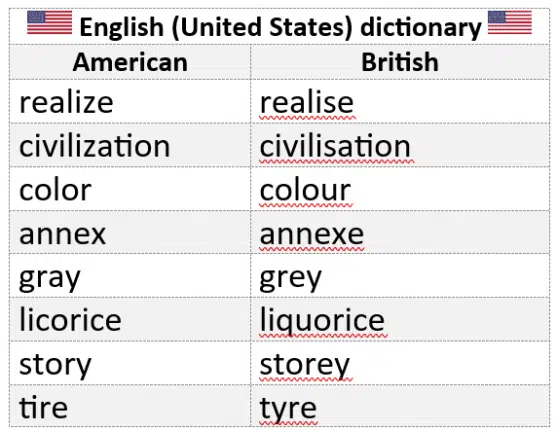Microsoft Word’s English dictionaries can be confusing because they don’t always mark incorrect spelling differences between US and UK English (like color/colour). We did some tests with surprising results.
English spellings can get screwy as you move between countries and there’s a lot more overlap than many people realize or realise 😁.
There are many words that are spelled differently, especially between US and British English but there’s no hard dividing line between each dialect. Here’s just a few that we’ll use for our tests of Microsoft Word dictionaries.
| American | British |
|---|---|
| realize | realise |
| civilization | civilisation |
| color | colour |
| annex | annexe |
| gray | grey |
| licorice | liquorice |
| story | storey |
| tire | tyre |
“Story” as in the level or floor of a building.
There’s plenty of “z vs s” and “o vs ou” examples. Wikipedia has a long explanation of American and British English spelling differences
And that’s before we get into words known in one area but not others. For example,UK English has “spelt” (past tense of spell) which is largely unknown in the USA, which uses ‘spelled’ instead.
No simple dividing line
With modern communication and travel, the old dividing lines between language variants have blurred. There’s no simple dividing line between what’s right or wrong in US vs UK English, let alone when you consider other dialects from India, South Africa, Canada, Australia, New Zealand, Singapore and others.
(Head honcho, Peter Deegan is very aware of these English spelling and usage differences as an Australian who lives in the UK but mostly writes for US audiences.)
Microsoft Word’s dictionaries reflect that blurred line with a mix of what’s accepted or not, depending on which English language dictionary you choose.
We’ve done some tests with Word 365 to see what words are marked as wrong (the red squiggly line). The results might surprise or annoy you.
US English vs UK/British English
The English (United States) dictionary mostly doesn’t accept the English (United Kingdom) spellings but there are exceptions like ‘grey”.

The spelling corrections suggest the US spelling version.
UK/British English with US words
On the other hand, the English dictionaries for United Kingdom, Australia and New Zealand are much more accepting of their American cousins <g>.
Some ‘US spellings’ are accepted by the dictionaries of other dialects.

That leads to complaints like this:
“Dear Microsoft Word, what is the point of letting me change the language to British spelling if you’re just going to let every usage of “realize” slip through unmarked?”
Canadian English with US and UK words
Perhaps inline with the Canadian stereotype <g>, the English (Canada) is polite and tolerant both US and UK spellings.

What can you do?
If you don’t like an accepted spelling, Word has a little known ‘Exclusion Dictionary’ for each dialect.
What SHOULD happen
The Word Grammar and Style settings need something to warn about use of the ‘other’ English spelling. In other words, a blue warning underline when a US spelling (gray) creeps into a UK/Aussie documents — or vice-versa.
Something for the Microsoft Office wish list ….
How to remove words from the Word dictionary
More uses for the Office Exclusion Dictionary